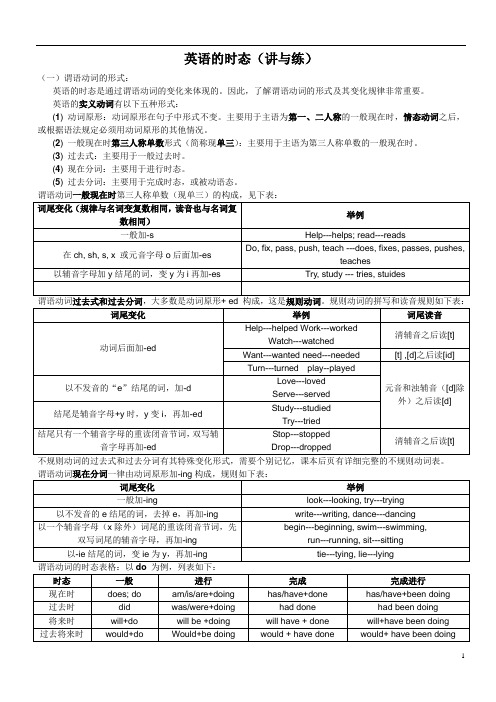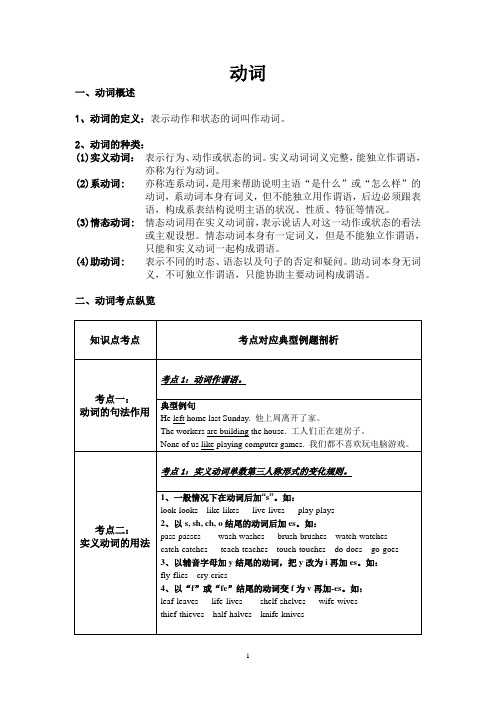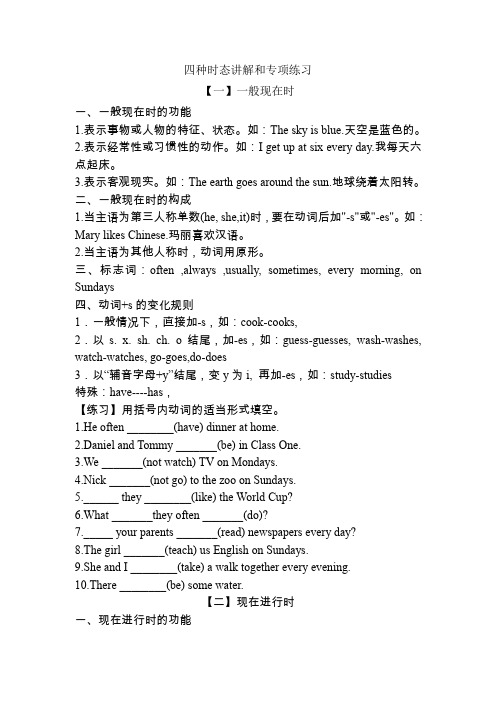小学动词时态讲解及练习 (1)
小学动词时态讲解及练习 (1)

总结
动词时态
名称
特征词
结构
一般现在 Usually通常, often经常, 非三单+动原 always总是, never从不, 三单+动词s\es sometimes有时,every 每一…… seldom 极少
现在进行 句首有look! listen,!
句中或句尾有now,
It’s ...(几点了) . 后的句 子
games. You You aren’t playing computer
games. He He isn’t playing computer
games.
一般疑问句 把be拉到句首,后面的句子不变。
Are you playing computer games? Are you playing computer games? Am I playing computer games? Are we playing computer games? Is he playing computer games? Is she playing computer games? Is it playing computer games? Are they playing computer games?
flowers in the morning?
( A) 9) Sometimes I ________ flowers
in the morning.
A water
B.waters C.watering
现在进行时结构 am\is are +动词ing, 特征词:句子前有look!或Listen! 句子前或句子未有now。
It is playing computer games now.
动词填空练习讲解 (加情态动词或助动词)

动词填空六种时态的构成及用法(1)一般现在时用法:①现在经常性的状态或动作;②客观事实和真理。
构成:①be+表语;②实义动词作谓语标志词:often, sometimes, usually, always, never,twice a month, every day/week/month/year...(every 系列)例句:He usually gets to school early.他通常很早到校。
The moon moves around the earth.月亮绕着地球转。
练一练1.认识从实践开始Knowledge practice.2.如果明天下雨,我们就不去公园了。
If it tomorrow,we to the park.【答案】1. begins with.2.rains,won’t go(2)一般过去时用法:表示过去的动作或状态。
构成:①was/were+表语;②实义动词作谓语标志词:a moment ago,just now,...ago, yesterday, last night/week/month...(last系列)例句:We went to Yunnan last Monday.上周一我们去了云南。
1.She (not visit)her aunt last weekend.2.My friend,Lucy, (study)for the math test and (practice)English last night.【答案】1.didn’t visit 2.studied practiced(3)一般将来时用法:表示将来的动作或状态。
构成:①will/shall+动词原形;②am/is/are going to+动词原形标志词:tonight, tomorrow, from now on, soon, in the future, next year...(next系列)例句:The twins will go to the cinema with their parents tonight. 这对双胞胎今晚将和他们的父母一起去看电影。
现在完成时及现在完成进行时讲解及练习(1)

一. 现在完成时的构成:主语+have(has)+过去分词过去分词的构成:规则动词的过去分词的构成:四种情况:(一)1.一般的也是绝大多数的动词是直接在后面加-ed,例如,played2.以e结尾的动词只加-d,例如,loved3.以辅音字母+y结尾的,变y为i再加-ed 例如, worried4.以一个辅音字母(r/w/y除外)结尾的重读闭音节,要双写这个辅音字母再加ed,例如,stopped, planned,(二)不规则动词的变化规则:这些不规则动词有下面一些规律可循,1. AAA型:let, set. hit .cut. put, shut .cost. hurt, read. spread2. AAB型:只有一个,beat---beat---beaten3. ABA型:run. come, become. overcome(克服)4.ABB型:可分为下面六组:第一组:都以t结尾. feel. keep. sleep weep sweep meet leave smell.deal spoil spill第二组:都是变d为t spend lend send build第三组:都是变其中的元音字母lose get win shine dig hang第四组:都以ught结尾, 其中catch, teach以aught结尾bring buy fight think catch teach第五组:都以“d”结尾tell sell lay pay say第六组:无规律组,必须硬记. find stand understand sit have make hold hear mean5.ABC型: 第一组:在过去式上加-n (注:过去式都是以“o+辅音字母+e”结尾的,但rise除外)break-broke-broken choose-chose-chosen forget-forgot-forgottenfreeze-froze-frozen wake-woke-woken speak-spoke-spokensteal-stole-stolen第二组:在原形上加-nsee-saw-seen give-gave-given drive-drove-driventake-took-taken draw-drew-drawn grow-grew-grownknow-knew-known throw-threw-thrown blow-blew-blownshow-showed-shown mistake-mistook-mistaken rise-rose-risen第三组:在原形上加-enwrite-wrote-written(双写t) eat-ate-eaten fall-fell-fallenride-rode-ridden (双写d) hide-hid-hidden(双写d)be-was/were-been第四组:符合i-a-u的原则,并且发音规律相同。
小学英语时态讲解及练习可直接.docx

小学英语语法【一】一般现在时一般现在时基本用法介绍一、一般现在时的功能1.表示事物或人物的特征、状态。
如:The sky is blue.天空是蓝色的。
2.表示经常性或习惯性的动作。
如:I get up at six every day.我每天六点起床。
3.表示客观现实。
如: The earth goes around the sun.地球绕着太阳转。
一般现在时用法练习一、出下列动词的第三人称单数drink ________ go _______ stay________ make ________look _________ have_______ pass_______ carry ____ come________ watch______ plant_______fly ________study_______ brush________ do______ teach_______ likeplay read wash be二、用括号内动词的适当形式填空。
1.He often ________(have) dinner at home.2.Daniel and Tommy _______(be) in Class One.3.We _______(not watch) TV on Monday.4.Nick _______(not go) to the zoo on Sunday.5.______ they ________(like) the World Cup?6.What _______they often _______(do) on Saturdays?7._____ your parents _______(read) newspapers every day?8.The girl _______(teach) us English on Sundays.9.She and I ________(take) a walk together every evening.10.There ________(be) some water in the bottle.11.Mike _______(like) cooking.12.They _______(have) the same hobby.13.My aunt _______(look) after her baby carefully.14.You always _______(do) your homework well.15.I _______(be) ill. I’m staying in bed.16.She _______(go) to school from Monday to Friday.17.Liu Tao _______(do) not like PE.18.The child often _______(watch) TV in the evening.19.Su Hai and Su Yang _____(have) eight lessons this term.20. - What day _____(be) it today?-It’s Saturday.三、按照要求改写句子2.I do my homework every day.(改为一般疑问句,作否定回答)_____________________________________________________3.She likes milk.(改为一般疑问句,作肯定回答)__________________________4.Amy likes playing computer games.(改为一般疑问句,作否定回答)___________________________________6.He speaks English very well.(改为否定句)_______________________________________________7.John comes from Canada.(对划线部分提问)_______________________一般现在时练习1. He often(have) dinner at home.2. Daniel and Tommy(be) in Class One.3. We(not watch) TV on Monday.4. Nick(not go) to the zoo on Sunday.5.they(like)the World Cup?6. What they often(do) on Saturdays?7.your parents(read)newspapers every day?8. The girl(teach)us English on Sundays.9. She and I(take) a walk together every evening.10. There(be) some water in the bottle.小学英语语法【二】现在进行时现在进行时1.现在进行时表示现在正在进行或发生的动作,也可表示当前一段时间内的活动或现阶段正在进行的动作。
小学英语各种时态综合讲解与练习

小学时态综合讲解与练习一、一般现在时的用法A、当谓语是be动词时,构成为:主语+be动词( am, is, are )+其他。
如:I am a student.B、当谓语是行为动词时,构成有两种:(1)主语(非第三人称单数)+动词原形+其他。
如:We often watch TV at the weekends.(2)主语(第三人称单数)+动词第三人称单数形式+其他。
如:Jim usually goes to the park on Sundays.C、句型变换:肯定句否定句一般疑问句及回答They watch TV at six everyday. They don’t watch TV at six everyday.---Do they watch TV at six everyday.---Yes, they do. / No, they don’t.She watches TV at six everyday. She doesn’t watch TV at six everyday.---Does she watch TV at six everyday.1.“是”动词的现在式是:am,is和are。
其用法如下(1) I a teacher.(2) You a student.(3) He a worker2.“有”动词的现在式是:have (got)或has (got)(1) I a book. I ( not) a book.(2) He a radio. He (not) a radio3.如果主语是第三人称单数,谓语动词要用第三人称单数形式,如果主语是其他人称,谓语动词用动词原形。
如:We study English well. He studies English well.(1) She (like) playing football(2) WangHua (love) animals very much.(3) I ( enjoy) watching TV every weekend.(4) We (play) football every day二、什么情况下用一般现在时?1.表示经常性或习惯性的反复发生的动作(1) Sometimes she ( go) to see a film in the evening(2) How do you usually ( come) to school?(3) He often (watch) TV on Saturdays2.表示现在的状态或特征(1) This book (be) easy to read.(2) Lily (draw) well.(3) It often ( rain) here in summer(4) I ( have) a dictionary3.表示客观事实或普遍真理:(1) Winter (be) colder than summer in China(2) The earth ( move) round the sun.(3) The sun (rise) in the east and (set)(落下)in the west.(4) The light (travel) much faster than the sound.(5) Shanghai (be) in the east of China4.常与一般现在时连用的时间状语有:often, sometimes, usually, always, every day( week, year, month) on Sundays, in the morning( afternoon, evening)等。
谓语动词的时态(讲解与练习)

英语的时态(讲与练)(一)谓语动词的形式:英语的时态是通过谓语动词的变化来体现的。
因此,了解谓语动词的形式及其变化规律非常重要。
英语的实义动词有以下五种形式:(1) 动词原形:动词原形在句子中形式不变。
主要用于主语为第一、二人称的一般现在时,情态动词之后,或根据语法规定必须用动词原形的其他情况。
(2) 一般现在时第三人称单数形式(简称现单三):主要用于主语为第三人称单数的一般现在时。
(3) 过去式:主要用于一般过去时。
(4) 现在分词:主要用于进行时态。
(5) 过去分词:主要用于完成时态,或被动语态。
(二)谓语动词的时态:“时态”就是通过谓语动词的形态变化,来表达动作发生的时间(现在、过去、将来、过去将来)及所处的状态(一般、进行、完成、完成进行)。
1、一般现在时(1)构成:通常以动词原形表示。
主语为第三人称单数时,用单三形式。
(2)用法:1)表示现状、性质、状态和经常的或习惯性的动作。
He has an uncle.他有个叔叔。
Autumn follows summer.夏天之后是秋天。
这些动词可与often, usually, always, sometimes, every day, once a week, on Sundays, never 等表示经常性或习惯性的时间状语连用。
例如:Do you often go to the cinema? 你经常去看电影吗?Tom does not study as hard as Jane. 汤姆在学习方面不如简努力。
My father never takes a bus; he walks to his office.我父亲从来不坐公共汽车,他走着去上班。
2)表示客观现实或普遍真理。
The sun rises in the east. 太阳从东方升起。
A horse is a useful animal. 马是一种有用的动物。
When Winter comes, can Spring be far behind? 冬天来了,春天还会远吗?(英国浪漫主义诗人雪莱的名句。
动词时态小学专项练习题及

动词时态小学专项练习题及动词时态小学专项练习题及解析在汉语和英语中,动词时态是两种语言中最基本、最重要的语法现象之一。
学好动词时态,对于学习语言的人来说是非常重要的。
然而,对于小学生来说,动词时态可能是一个困难的问题。
在这篇文章中,我们将提供一些动词时态的练习题及解析,帮助小学生更好地掌握动词时态。
一、一般现在时1.我每天(去/去es)学校。
答案:我每天去学校。
解析:主语是“我”,动词是“去”,这是一般现在时。
所以要用第三人称单数的变化(去+es=去es)。
2.你通常(喜欢/喜欢s)吃蔬菜吗?答案:你通常喜欢吃蔬菜吗?解析:主语是“你”,动词是“喜欢”,这是一般现在时。
所以不需要变化。
二、一般过去时1.昨天他(玩/玩ed)游戏了。
答案:昨天他玩游戏了。
解析:主语是“他”,动词是“玩”,这是一般过去时。
所以要用过去式(玩+ed=玩ed)。
2.我们(看/看了)电影了。
答案:我们看了电影了。
解析:主语是“我们”,动词是“看”,这是一般过去时。
所以要用过去式(看+了=看了)。
三、现在进行时1.他现在(跳/跳ing)绳。
答案:他现在跳绳。
解析:主语是“他”,动词是“跳”,这是现在进行时。
所以要用现在分词(跳+ing=跳ing)。
2.你(做/做ing)什么?答案:你在做什么?解析:主语是“你”,动词是“做”,这是现在进行时。
所以要用现在分词(做+ing=做ing)。
四、将来时1.我明天(要/要)去看电影。
答案:我明天要去看电影。
解析:主语是“我”,动词是“要去看”,这是将来时。
所以要用“要+动词原形”。
2.你们下个星期(会/会)去哪里旅游?答案:你们下个星期会去哪里旅游?解析:主语是“你们”,动词是“会去旅游”,这是将来时。
所以要用“会+动词原形”。
五、综合练习1.小明经常(骑/骑es)自行车去学校,但今天他(步行/步行ed)去了。
答案:小明经常骑自行车去学校,但今天他步行去了。
解析:第一空是经常性的行为,要用一般现在时。
小学英语语法——动词知识点讲解+练习

动词
一、动词概述
1、动词的定义:表示动作和状态的词叫作动词。
2、动词的种类:
(1)实义动词:表示行为、动作或状态的词。
实义动词词义完整,能独立作谓语,
亦称为行为动词。
(2)系动词: 亦称连系动词,是用来帮助说明主语“是什么”或“怎么样”的
动词,系动词本身有词义,但不能独立用作谓语,后边必须跟表
语,构成系表结构说明主语的状况、性质、特征等情况。
(3)情态动词: 情态动词用在实义动词前,表示说话人对这一动作或状态的看法
或主观设想。
情态动词本身有一定词义,但是不能独立作谓语,
只能和实义动词一起构成谓语。
(4)助动词: 表示不同的时态、语态以及句子的否定和疑问。
助动词本身无词
义,不可独立作谓语,只能协助主要动词构成谓语。
二、动词考点纵览。
英语六年级时态讲解加习题

going to have 8. They are ______________ ( have ) a meeting next week, aren't they? are 9. Both he and I ________ (be) teachers.
10. I ___________ didn’t feel (not feel ) very well yesterday .
said 2. Do you believe what he ________ (say) just now? is sleeping (sleep) in the sofa. 3. Look! The lazy cat ____________
4. There _______(be) a book and two pens on the desk. is
时态
动词时态是表示动作或状态发生或存在的时间 和表示方式的一种动词形式。
小学阶段所学的时态有: 1.一般现在时:do/does 2. 现在进行时:be doing 3. 一般将来时:be going to do/will do 4. 一般过去时:did
I / You / We / They + do(动词原形)
yesterday / the day before yesterday / three days ago / one month ago / last year / last month / last night / yesterday evening
1. Peter ________ plays (play) basketball twice a week.
is waiting (wait) for you at the school gate. 14. Hurry! Your mother ____________
专题10 动词四大时态-小学语法精讲精练(附口诀、练习和答案)

小学语法精讲精练专题10 时态思考引入同学们,想跟老师一起来一趟时空之旅吗?想!我们真的可以穿越时空吗?当然不是真的穿越时空啦!老师说的是我们这节课要学的动词时态吧。
哈哈!是的,我说的"时空之旅"就是跟随动词形式变化进行的时态之旅。
我们可以通过动词的不同形式来体现不同时间发生的动作或存在的状态,可以从中体验过去、现在、未来发生的各种趣事!知识概览一、一般现在时一般现在时表示习惯性、永久性的或反复发生的动作或现在存在的状态。
1.一般现在时的结构 (1)肯定结构①主语+ am/is/are +表语知识精讲I am Chinese.我是中国人。
②主语+谓语动词原形/第三人称单数形式(+其他)I like swimming.我喜欢游泳。
③主语+情态动词+谓语动词原形(+其他)I can finish my work today.我今天可以完成我的工作。
(2)否定结构①主语+ am not/isn't/aren't +表语She isn't a nurse.她不是护士。
②主语+ don't/doesn't+谓语动词原形(+其他)I don't like bananas.我不喜欢香蕉。
③主语+情态动词的否定式+谓语动词原形(+其他)We shouldn't run the red light.我们不应该闯红灯。
(3)一般疑问句结构①Is/Are +主语+表语Are you a doctor?你是医生吗?②Do/Does +主语+谓语动词原形(+其他)Do you want to play basketball?你想打篮球吗?③情态动词+主语+谓语动词原形(+其他)Can you jump far,Sam?山姆,你能跳得很远吗?(4)特殊疑问句结构:特殊疑问词+一般疑问句句式What can you do?你会做什么?Who is your father?你的父亲是谁?When does he usually go to school?他通常什么时候上学?2.一般现在时的用法(1)表示经常性或习惯性的动作或存在的状态I take a walk after dinner every day.我每天晚饭后散步。
小学四种时态讲解及专项练习

四种时态讲解和专项练习【一】一般现在时一、一般现在时的功能1.表示事物或人物的特征、状态。
如:The sky is blue.天空是蓝色的。
2.表示经常性或习惯性的动作。
如:I get up at six every day.我每天六点起床。
3.表示客观现实。
如:The earth goes around the sun.地球绕着太阳转。
二、一般现在时的构成1.当主语为第三人称单数(he, she,it)时,要在动词后加"-s"或"-es"。
如:Mary likes Chinese.玛丽喜欢汉语。
2.当主语为其他人称时,动词用原形。
三、标志词:often ,always ,usually, sometimes, every morning, on Sundays四、动词+s的变化规则1.一般情况下,直接加-s,如:cook-cooks,2.以s. x. sh. ch. o结尾,加-es,如:guess-guesses, wash-washes, watch-watches, go-goes,do-does3.以“辅音字母+y”结尾,变y为i, 再加-es,如:study-studies特殊:have----has,【练习】用括号内动词的适当形式填空。
1.He often ________(have) dinner at home.2.Daniel and Tommy _______(be) in Class One.3.We _______(not watch) TV on Mondays.4.Nick _______(not go) to the zoo on Sundays.5.______ they ________(like) the World Cup?6.What _______they often _______(do)?7._____ your parents _______(read) newspapers every day?8.The girl _______(teach) us English on Sundays.9.She and I ________(take) a walk together every evening.10.There ________(be) some water.【二】现在进行时一、现在进行时的功能现在进行时表示现在正在进行或发生的动作,也可表示当前一段时间内的活动或现阶段正在进行的动作。
小学英语四大时态总结及练习题

你知道时态是什么意思吗?时态代表什么吗?小学英语就四个时态,你掌握了吗?你能发现它们之间的共同点和不同点吗?勤加练习,百战不殆I.把下列动词变为第三人称单数形式。
1. clean--2. go--3. have--4. do-6. fly--7. come-- brush-9. watch-- 10. study-- 11. ask--13. swim-- 14. catch-- 15. write--16. eat-- 17. make-- 18. paint—19. learn-- 20. phone-- 21. run—22. hop-- 23. sing-- 24. pick—II.把下列动词变成过去式is\am________ fly______ plant_____ are________ drink_________play_______ go________ make ______ do_________dance________ worry_____ask _____ taste_________ eat________draw________ put ______ throw________ kick_________pass_______ do ________III.把下列动词变成动名词形式。
wake________ make__________ come____________ have____________take_________ leave__________ rid_________, regret__________,begin________ cut________, get_________, hit_________, run_________, set_________, sit__________, spit__________, stop_________, swim________, beg_________, drop__________, fit_________, nod_________, dig___________, forget_________, travel_________ visit_________ carry_________ enjoy___________ play ___________ study _____die_________ lie_________多加练习,百战不殆之时态篇一、用单词的正确形式填空:1.Mike _________ (do) his homework every day.2.There __________(be) some water in the glass.3.We like ________ (play) basketball after class.4.I like singing. I often _________(listen) to the music in the evening.5.My grandma_________(watch) TV every day.三、选择最佳的答案:1. ____Alice often play the piano? No, she _____. A. Do; do B. Does; does C. Does; doesn't2. ___ your penpal __ in Beijing? A. Do; live B. Do; lives C. Does; live3. Tom and Mike __ very excited, they will take a trip. A. is B. are C.am4. I like ________ very much. What about you? A. dance B. danced C. dancing5. The kite ____ a bird. A. look like B. is looking C. lookslike6. Bill and I ___ good friends. A. is B. are C. am7. Sandy often ___ his homework on Sundays . A. do B. does C. did8. What do you usually do on the weekend? I __________.A. went swimmingB. go swimmingC. visited grandparents9. What do you usually do on your holiday? I usually __________.A. saw elephantsB. sing and dance picture10. I ____ a student. I go to school ____bus every day. A. is; by B. am; onC. am; by11. I ____ a brother. She ____ a sister. A. have; has B. has; hasC. have; have12. You ____ a student. He ____ a teacher. A. is; is B. are; is C. are;are13. He always _____ football games. A. watches B. watch C. doesn't14. My best friend _____ shells. A. collects B. collect C. often15. She doesn’t _____ listening to the music. A. often B. like C. likes16. My mother and I ___ always watch romantic films. A. doesn’t B. don’tC. do17. ---When _____ he get home on Friday?----He gets home at four on Friday. A. do B. does C. did18.Summer _________ spring.A. comes afterB. comes in before二、用单词的适当形式填空:1. look! Chen Jie and Mike are ___________(sing)now.2. The small bear is _____________ (climb) the tree.3. Mike is ________________ (draw) picture.4. She is ________________ (do) the dishes.5. My brother __________ (make) kites now.6. My father is ___________ (read) a newspaper in living room.7. Ted is __________(answer) the phone.8. My uncle is ____________ (drive) a car.9. The students are ______________(listen) to their teacher carefully.10. Chen Jie is _________(wash) clothes.11. His sister _______ (be) writing an e-mail.12. We ______(be) cleaning the classroom now.13. I____ (be)working on my computer.14. They _____ (be)playing basketball.15. Look, The tiger ________ __________(walk).16. Look, The elephants ______ _____________(drink) water with their trunk.17. Look, The monkeys ________ ___________ (swing).18. Peter _________ ______________(take) pictures now.19. They _____ ________(take)up the apples now.20. We _______ ________(catch) butterflies now.三、选择正确答案1. Every one ____ to their teacher in the classroom. A. are listening B. is listening C. listen2. They are singing and ___ together at the party now. A. dance B. dancedC. dancing3. Listen! The birds ____. A. is singing B. are sing C.are singing4. Look! The kite ___ in the sky. A. fly B. flies C. is flying5. They ____ riding a forse. A. is B. are C. am6. Kate ____ playing chess. A. am B. is C. are7. Are you washing clothes? A. Yes, you are B. Yes, I amC. No, I am8. Is he ____ TV?Yes, he is. A. watch B. watching C. not9. ____ they taking pictures.? Yes, they are. A. Am B. Be C. Are10. It’s 10 o’clock. Ben _____ TV in the bedroom. A. watch B. is watchingC. watches五、根据中文填空。
二年级动词时态练习题及讲解

二年级动词时态练习题及讲解一、选择题1. 我们通常在晚饭后 __________ 电视。
(A) (a)看 (b)看见 (c) 看到2. 昨天晚上,妈妈 __________ 青菜给我们吃了。
(C) (a) 做 (b)炒 (c) 做了3. 每天早上,爸爸都会 __________ 报纸。
(B) (a) 读 (b)读书(c) 读了4. 弟弟喜欢 __________ 玩具。
(A) (a) 玩 (b) 玩了 (c) 玩过5. 姐姐经常 __________ 妹妹的衣服。
(C) (a) 穿 (b) 穿了 (c) 穿上6. 妈妈正在 __________ 饭。
(A) (a) 做 (b) 做了 (c) 做过7. 弟弟去 __________ 他的朋友。
(B) (a) 办公室 (b) 拜访 (c) 打电话8. 昨天晚上妈妈 __________ 时间陪我做作业。
(C) (a) 用 (b) 用了 (c) 用了一些二、填空题1. 我昨天去图书馆, __________ 图书馆员。
(被询问时态) (回答:和图书馆员交谈)2. 爸爸经常 __________ 关于历史的书。
(读书的动作) (回答:看书)3. 我喜欢 __________ 故事书。
(借阅的动作) (回答:看)4. 弟弟正在 __________ 玩具。
(做玩具的动作) (回答:制作)5. 我们通常 __________ 棒球比赛。
(参加活动) (回答:观看)三、改错题1. 昨天晚上,妈妈做了一顿丰富的晚餐,我们大家玩得非常开心。
改正:昨天晚上,妈妈做了一顿丰盛的晚餐,我们都吃得非常开心。
2. 我们在黄昏时分爬到了山上,看到了美丽的日出。
改正:我们在黄昏时分爬上山顶,看到了美丽的日出。
3. 他前天去了朋友家,他们玩得非常开心。
改正:他前天去了朋友家,他们玩得非常开心。
四、作文题题目:我的周末计划亲爱的同学们,周末就要来临了,你有什么计划呢?请用英语写一篇短文,介绍一下你的周末计划吧!Hello, everyone!I am going to share my weekend plan with you. I have been looking forward to it!On Saturday morning, I am going to visit the library with my mom. Ilove reading, and I want to borrow some interesting storybooks. After that,we are going to have a picnic in the park. I will bring snacks and drinks. We can play games and enjoy the sunshine together. It will be a fun time!On Sunday, I will help my dad plant flowers in our garden. I enjoy spending time with my dad and learning how to take care of plants. Then, in the afternoon, I will have a piano lesson. I have been practicing a lot, and I am excited to show my teacher how much I have improved. After the lesson, I will go to my friend's house and have a playdate. We will play board games and have a great time together.I am really excited about my weekend plans. I hope you all have a wonderful weekend too!以上是关于二年级动词时态练习题及讲解的文章。
小学英语语法第一讲-动词时态练习答案解析及解题方法总结

动词时态练习答案解析及解题方法总结1.找出下列句子中的错误.并改为正确的句子。
1、Y our baby is crying.解析:现在进行时结构为“be doing sth.”,句中常出现像now, Look, Listen等指示词,表示现在正在进行的动作或状态。
动词的变化有三种形式:1)直接在词尾加上-ing,如look-looking;2)以不发音的“e”结尾的单词,去“e”后在词尾加上-ing,如love-loving;3)以重读闭音节结尾的词,双写最后一个字母,再在词尾加-ing,如cut-cuting。
2、What did you do last night?解析:句中出现表示过去的指示词“last night”,应该用一般过去时。
3、LiBai wrote many poems.解析:李白写诗发生在过去,应该用一般过去时。
4、I was born in 1998 and I have two brothers.解析:我现在还有两兄弟,所以应该为一般现在时。
5、He will come back soon.解析:句中出现将来时的指示词“soon”,故用一般将来时。
6、They work for 9 hours.解析:现在进行时不能与一段时间联用,故应该用一般现在时表示“他们工作了9个小时”。
7、Light travels faster than sound.解析:光速比音速快是客观事实,应该用一般现在时。
2.选择填空1、D 解析:句中出现现在进行时的指示词“Listen”,应该用现在进行时表示正在进行的动作或状态。
2、C 解析:句中出现一般过去时的指示词“last night”,应该用一般过去时表示过去的动作或状态。
3、D 解析:句中出现一般现在时的指示词“sometimes”,应该用一般现在时表示经常性的动作,又因为主语是第三人称单数,所以动词应作相应变化。
4、A解析:第一句话是问张老师现在哪里,所以应该用一般现在时而不用一般过去时;第二句话中出现一般过去时的指示词“just now”,表示“刚才”,应该用一般过去时表示发生过的动作。
小学英语时态讲解及练习修订版

小学英语时态讲解及练习Company number:【WTUT-WT88Y-W8BBGB-BWYTT-19998】小学英语时态讲解及练习一般现在时态及第三人称单数第三人称单数问题一般现在时中,当主语是第三人称单数时,即常在动词原形后加-s或-es。
第三人称单数变化,现归纳总结如下:1.人称代词he, she, it是第三人称单数。
如:He likes watching TV.他喜欢看电视。
She has lunch at twelve.她十二点吃午餐。
It looks like a cat.它看起来像只猫。
2.单个人名、地名或称呼作主语;用第三人称单数。
如:①H an Mei looks like her mother.韩梅看起来像她的母亲。
②Beijing is in China.北京在中国。
③Uncle Wang often makes cakes.王叔叔经常做蛋糕。
3.单数可数名词或"this / that / the/ a +单数可数名词"作主语时,是第三人称单数。
如:①A horse is a useful animal.马是有用的动物。
②This book is yours.这本书是你的。
③That car is red.那辆小汽车是红色的。
④The cat is Lucy's.这只猫是露茜的。
4.不定代词someone, somebody, nobody, everything, something等及指示代词this, that作主语时,第三人称单数。
①Everyone is here.大家到齐了。
②There is something wrong wi th the watch.这块手表有毛病。
③This is a pen.这是一支钢笔。
④That is an eraser.那是一块橡皮擦。
5.不可数名词作主语时为第三人称单数。
如:①The milk is in the glass.②The bread is very small.6.当数字或字母作主语时,看作第三人称单数。
小学各时态讲解及练习

一般现在时Step 1: 时态概念时态,指在不同的时间条件下,动词的形式。
数轴对比各种时态Step 2: 用法1.经常性或习惯性的动作,常与表示频度的时间状语连用。
如:every ~, sometimes, on SundaysI go to school at 7 every morning.Sometimes I am careless.I have piano lessons on Sundays.2.客观真理,客观存在。
The earth moves around the sun.Shanghai lies in the east of China.3.在格言或警句中。
Pride goes before a fall.骄者必败。
Step 3:一般现在时的谓语动词1.当谓语是be动词时主语+be+表语I ------ am 主语第三人称单数(he, she, it, 单个人名、地名/称呼)------ is 其它(we, you, they及其它复数)------- are 例句:…….是老师。
2.当谓语是行为动词时主语+行为动词+其它第三人称单数时------- 动词变为三单形式主语其它------- 动词原形例句:……每天学英语。
补充:三单形式变化规则1.一般情况下,直接加-s,如:cook-cooks, milk-milks2.以s. x. sh. ch. o结尾,加-es,如:guess-guesses, wash-washes,watch-watches, go-goes3.以“辅音字母+y”结尾,变y为i, 再加-es,如:study-studies 练习:一、写出下列动词的三单形式drink ________ go _______ stay ________ make ________look _________ have_______ pass_______ carry ____come________ watch______ plant_______ fly ________study_______ brush________ do_________ teach_______二、用括号内动词的适当形式填空。
- 1、下载文档前请自行甄别文档内容的完整性,平台不提供额外的编辑、内容补充、找答案等附加服务。
- 2、"仅部分预览"的文档,不可在线预览部分如存在完整性等问题,可反馈申请退款(可完整预览的文档不适用该条件!)。
- 3、如文档侵犯您的权益,请联系客服反馈,我们会尽快为您处理(人工客服工作时间:9:00-18:30)。
总结
动词时态
名称 特征词 结构
一般现在 Usually通常, often经常, 非三单+动原 always总是, never从不, 三单+动词s\es
sometimes有时,every 每一…… seldom 极少
现在进行 句首有look! listen,!
句中或句尾有now, be(am\is\ar It’s ...(几点了) . 后的句 e + doing 子
It
They
现在进行时:
说话时正在做的事情。
关键词:
句首有look! listen,! 句中或句尾有now, It’s ...(几点了) . 后的句子
动词构成
I
They
be(am is are)+doing
am playing computer games now. are playing computer games now. are playing computer games now . are playing computer games now . is playing computer games now. is playing computer games now. is playing computer games now.
一般疑问句 非三单句子+Do。
三单句子前+Does。
I We You You He She
Do you play computer games? Do you play computer games? Do I play computer games? Do we play computer games? Does he play computer games? Does she play computer games? Does it play computer games? Do they play computer games?
We
You He She It
否定形式
I We
be+ not +doing
You You
He
I am not playing computer games. We aren’t playing computer games. You aren’t playing computer games. You aren’t playing computer games. He isn’t playing computer games.
一般疑问句 把be拉到句首,后面的句子不变。
Are you playing computer games? Are you playing computer games? Am I playing computer games? Are we playing computer games? Is he playing computer games? Is she playing computer games? Is it playing computer games? Are they playing computer games?
一般现时:
1、经常性发生的事情、习 惯和爱好等 2、或者是指一些客观存在 的事实或规律。
时间词有: Usually通常, often经常, always总是, never从不, sometimes有时,every 每一…… seldom 极少
结构
I We You They You She It He
否定形式
I We You They He
非三单动词前+ don’t 三单动词前+does+not
She
It
don’t play computer games. don’t play computer games. don’t play computer games. don’t play computer games. doesn’t play computer games. doesn’t play computer games. doesn’t play computer games.
练习
(B )1)Look! They are ________ . A.are swimming B.swimming C..swims
(
B)2)Listen! Sally ________ in the classroom.
.A.singing B. is singing C.sings
(A)3) We are _______ lesson now. A.having B.has C. have ( )4)We ________football next Sunday. A A. will play B. play
C. plays
(B )5) Is he __s going to do C.will do ( B ) 6)Jiamin ____to Guangzhou in 2014. A.go B. will go C.goes (B )7) My mother often____flowers in the morning. (A )8) Does your mother usually ______ flowers in the morning? ( A) 9) Sometimes I ________ flowers in the morning. A water B.waters C.watering
现在进行时结构 am\is are +动词ing, 特征词:句子前有look!或Listen! 句子前或句子未有now。
将来时结构will或be going to 接动词原形。 特征词:tomorrow明天, next下一个。。。 和表示将来的时间如: in 2015. this Sunday 一般现在时结构(三单+动词加s\es 非三单+动原) 特征词:usually通常 often 经常 sometimes 有时 never从不 seldom极少 every 每一个 always 一直 过去时结构:动词用过去式 特征词:ago 以前 yesterday昨天 last … 上。。。 just now 刚刚 this morning 表示过去的具体时间例如:2010
非三单+动词原型 三单+动词-s\es
often play computer games. never play computer games. always play computer games. usually play computer games. often play computer games. seldom plays computer games. never plays computer games. often plays computer games.
